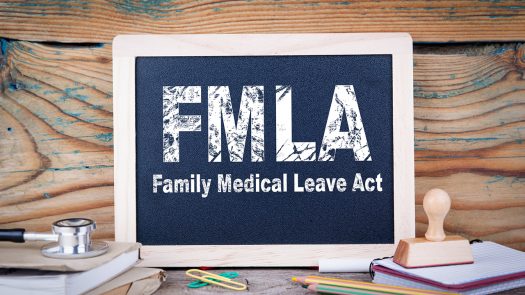YOUR RIGHT TO TIME OFF WORK WHEN A FAMILY MEMBER IS INJURED OR CALLED TO ACTIVE DUTY
 When the federal government passed the Family and Medical Leave Act (FMLA), eligible employees were guaranteed up to 12 weeks of unpaid leave each year to deal with critical medical conditions affecting themselves or their family members. The FMLA also encompasses special rights for employees with family members serving active military duty.
When the federal government passed the Family and Medical Leave Act (FMLA), eligible employees were guaranteed up to 12 weeks of unpaid leave each year to deal with critical medical conditions affecting themselves or their family members. The FMLA also encompasses special rights for employees with family members serving active military duty.
These military provisions are meant to alleviate the difficulties that active-duty presents to families. The FMLA provides two types of medical leave for military families:
- Qualifying Exigency Leave – Covered employees may take up to 12 weeks per year, also called qualifying exigency leave, to deal with matters relating to a family member’s active duty or call to active duty. As a military family, life can change abruptly, and the FMLA gives you the freedom to attend to these changes away from work.
- Military Caregiver Leave – If a family member falls dangerously ill or gets injured on active military duty, employees can take up to 26 weeks of leave in a single year to care for them.
If you are the child, parent, or spouse of someone on active military duty, you are permitted to take qualifying exigency leave per the FMLA. If the servicemember has been injured and has fallen ill while on duty, the circle of who can take off work is expanded to include “next of kin,” defined as the service member’s nearest blood relative or a blood relative. If you have recently received retaliation for exercising these rights, you have a case for a lawyer for medical leave denial.
You can present your claims to a military-based family sick leave attorney Los Angeles from Mann & Elias. Together, you can take your workplace to court over FMLA violations.
Qualifying Exigency Leave
The law specifies the following qualifying exigencies to get permitted per the FMLA:
- Deployment on short notice – The employee may take up to a week of leave to address any issues arising from a sudden call of duty, meaning the servicemember was given seven or fewer days’ notice.
- Military events and related activities – The employee may take family leave to attend military ceremonies, programs, and events.
- Child care and school activities – The employee may leave work to arrange care for the service member’s child. The employee does not have to be related to the military member’s child, but the military member must be their spouse, parent, or child.
- Financial and legal arrangements – The employee may need to take time off to deal with legal matters, such as making or updating a will or assigning a power of attorney.
- Counseling – The FMLA permits time off for mental health. Employees are allowed to take time off to attend counseling.
- Rest and recovery – The employee may take up to fifteen days off to spend with a family member on temporary R&R leave during active duty.
- Post-deployment activities – Servicemembers are often greeted with ceremonies, events, and other briefings when they return from service. The employee can take time off to accompany the servicemember to these events. They can also take time off to handle matters if the family member has died while on active duty.
Military Caregiver Leave
It’s no secret that those who serve in the military are put in danger every day, so in the event that a military member is injured or falls seriously ill while deployed, a family member can take time off to care for them.
A serious injury or illness is defined as anything that befalls a servicemember, making them no longer fit to serve in active duty. This time off is allotted regarding the event that has affected the servicemember. In a 12-month period, employees can take off 26 weeks to deal with whatever injury or illness is at hand. An employee can take another 26 weeks off in a different 12-month period to deal with those same ailments if an active service member.
FMLA guarantees the employee this time off, and it reserves the continuation of their health benefits and reserves the same job position upon their return. If you return from your leave of absence to find that an employer gave your position away or the company dismisses you, you may need a lawyer.
Requesting FMLA Leave
The military provisions of the FMLA can be exercised intermittently. Employees should give notice at least 30 days in advance or as soon as practicable so that their employer can prepare for their absence.
The employee is also asked to take reasonable care to schedule their leave at a time that does not severely disrupt their workplace business operations. In addition, an employer can legally ask for written proof of the need for leave, but they cannot ask for medical records.
Family comes first and foremost, so your employer should approve your request to tend to your family member. If they deny your request or fire you for taking time off, then you may need to consult a Los Angeles labor attorney for employees regarding your situation.
Pursuing a Case
FMLA is guaranteed at a federal level, and you have every right to take this time off to tend to your life as a military family. If your workplace is not giving you this time off, then you can take legal action.
At Mann & Elias, we will help military families protect their right to job-protected leave. Our firm has experience winning monetary damages and injunctive relief for their clients who have gotten denied FMLA-allotted leave.
